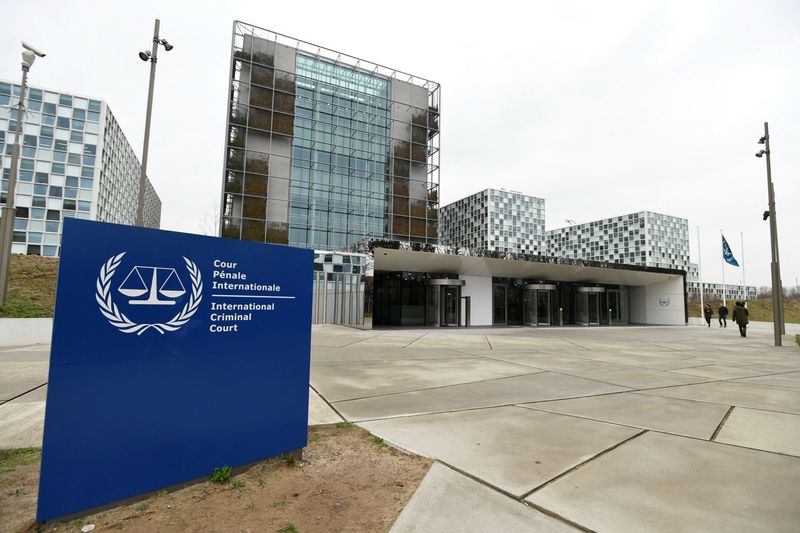By Stephanie van den Berg
THE HAGUE (Reuters) - Judges at the International Criminal Court (ICC) issued arrest warrants on Thursday for Israeli Prime Minister Benjamin Netanyahu and his former defence chief and a Hamas leader for alleged war crimes and crimes against humanity.
The move comes after the ICC prosecutor Karim Khan announced on May 20 that he was seeking arrest warrants for alleged crimes connected to the Oct.7 attacks on Israel by Hamas and the Israeli military response in Gaza.
Here is a look at what could happen next, and how the ICC prosecutor's move might affect diplomatic relations and other court cases focused on Gaza.
WILL NETANYAHU AND THE HAMAS LEADER BE ARRESTED?
All 124 member states of the ICC are obliged by the court's founding statute to arrest and hand over any individual subject to an ICC arrest warrant if they set foot on their territory.
But the court has no means of enforcing such an arrest. It has no police force, so the arrest of suspects must be carried out by a member state or a cooperative state.
Sanctions for not arresting someone despite a warrant are little more than a diplomatic slap on the wrist, such as the referral of a country to the ICC's governing body made up of member states and ultimately to the U.N. security council.
ICC members include all European Union countries, the United Kingdom (TADAWUL:4280), Canada, Japan, Brazil and Australia. In the Middle East region, the Palestinian territories and Jordan are ICC members. Israel is not a member state, nor is the United States.
The court bases its jurisdiction over Israeli officials on the fact that the Palestinian territories were admitted as a member state in 2015. The court can prosecute alleged atrocity crimes committed by nationals of member states and crimes committed by anyone, regardless of their nationality, on the territory of member states.
CAN AN ICC INVESTIGATION OR WARRANT BE PAUSED?
The court's rules allow for the U.N. Security Council to adopt a resolution that would pause or defer an investigation or a prosecution for a year, with the possibility of renewing that annually.
After a warrant is issued the country involved or a person named in an arrest warrant can also issue a challenge to the jurisdiction of the court or the admissibility of the case.
A case can be deemed inadmissible at the ICC when it is already being investigated or prosecuted by a state with jurisdiction over the crimes alleged.
But the court has made it clear in the past that this exemption could only apply when a state is investigating or prosecuting the same people for substantially the same alleged crimes. An investigation into corruption charges, for instance, would not meet that "same person, same conduct" rule.
If there is a request to delay the investigation, the prosecutor will pause the case and review if the state which requested the deferral is indeed carrying out a genuine investigation.
If the prosecutor deems the national investigations are insufficient, he can apply for judges to reopen the investigation.
CAN NETANYAHU AND OTHER ACCUSED STILL TRAVEL?
Yes they can. The issuance of an ICC arrest warrant is not a formal travel ban. However, they do risk arrest if they travel to an ICC signatory state, which may influence indictees' decision-making.
There are no restrictions on political leaders, lawmakers or diplomats from meeting individuals with an ICC arrest warrant against them. Politically, however, public perceptions of this may be bad.
WILL THIS APPLICATION FOR WARRANTS INFLUENCE OTHER CASES?
Not directly, but perhaps indirectly.
The ICC application is a separate matter from, for example, court cases demanding an arms embargo against Israel or South Africa's case at the U.N.'s top court, the International Court of Justice, which accuses Israel of violating the Genocide Convention in Gaza.

However a decision by ICC judges that there are reasonable grounds to believe Netanyahu and former defence minister Yoav Gallant are committing war crimes and crimes against humanity in Gaza, it could strengthen South Africa's ICJ case, as that court also looks at other courts' determinations.
The decision to issue a warrant can also bolster legal challenges demanding an arms embargo elsewhere, as numerous states have provisions against selling arms to states which might use them in ways that violate international humanitarian law.